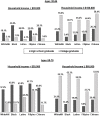Racial-ethnic differences in prevalence of social determinants of health and social risks among middle-aged and older adults in a Northern California health plan
- PMID: 33147232
- PMCID: PMC7641349
- DOI: 10.1371/journal.pone.0240822
Racial-ethnic differences in prevalence of social determinants of health and social risks among middle-aged and older adults in a Northern California health plan
Abstract
Background: Social determinants of health (SDoHs) and social risks (SRs) have been associated with adverse health and healthcare utilization and racial/ethnic disparities. However, there is limited information about the prevalence of SRs in non-"safety net" adult populations and how SRs differ by race/ethnicity, age, education, and income.
Methods: We analyzed weighted survey data for 16,247 White, 1861 Black, 2895 Latino, 1554 Filipino, and 1289 Chinese adults aged 35 to 79 who responded to the 2011 or 2014/2015 Kaiser Permanente Northern California Member Health Survey. We compared age-standardized prevalence estimates of SDoHs (education, household income, marital status) and SRs (financial worry, cost-related reduced medication use and fruit/vegetable consumption, chronic stress, harassment/discrimination, health-related beliefs) across racial/ethnic groups for ages 35 to 64 and 65 to 79.
Results: SDoHs and SRs differed by race/ethnicity and age group, and SRs differed by levels of education and income. In both age groups, Blacks, Latinos, and Filipinos were more likely than Whites to be in the lower income category and be worried about their financial situation. Compared to Whites, cost-related reduced medication use was higher among Blacks, and cost-related reduced fruit/vegetable consumption was higher among Blacks and Latinos. Younger adults were more likely than older adults to experience chronic stress and financial worry. Racial/ethnic disparities in income were observed within similar levels of education. Differences in prevalence of SRs by levels of education and income were wider within than across racial/ethnic groups.
Conclusions: In this non-"safety net" adult health plan population, Blacks, Latinos, and Filipinos had a higher prevalence of social risks than Whites and Chinese, and prevalence of social risks differed by age group. Our results support the assessment and EHR documentation of SDoHs and social risks and use of this information to understand and address drivers of racial/ethnic disparities in health and healthcare use.
Conflict of interest statement
The authors have read the journal’s policy and have the following competing interests: NPG is a paid employee of Kaiser Permanente Northern California. This does not alter our adherence to PLOS ONE policies on sharing data and materials. There are no patents, products in development or marketed products associated with this research to declare.
Figures





References
-
- Heiman HJ, Artiga S. Beyond Health Care: The Role of Social Determinants in Promoting Health and Health Equity. November 2015. Washington, DC: The Henry J. Kaiser Family Foundation, 2015.
Publication types
MeSH terms
LinkOut - more resources
Full Text Sources

